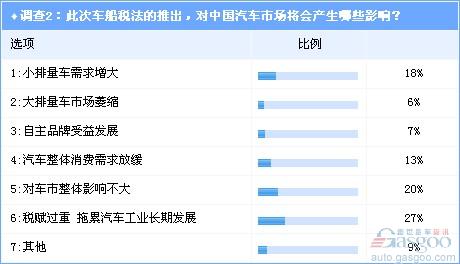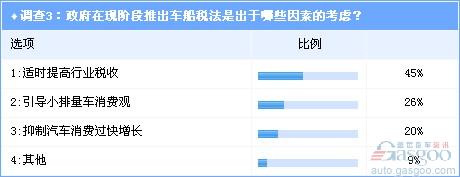As one of the most popular topics in the industry recently, the fierce discussion triggered by the tax reform of vehicles and ships has greatly exceeded the expectations of the relevant departments, among which the objections and doubts are particularly loud. According to the latest industry survey conducted by Gasgoo.com, only 24% of those involved in the survey clearly expressed their support. Over 70% of industry insiders are not optimistic about the positive impact of the bill.
In mid-October, the State Administration of Taxation disclosed that the State Council's executive meeting had discussed and adopted in principle the "People's Republic of China Taxation Law on Vehicles and Vehicles (Draft)." On October 25, the draft was first submitted to the Eleventh National People's Congress Standing Committee for its deliberation at the seventeenth meeting, and was formally announced on the 29th of that month for consultation with the public (the deadline for collection is November 30th). According to the plan for taxation of vehicles and ships announced in the draft, passenger cars will be taxed on a 7-speed basis according to displacement. The annual tax will be 60 to 5400 yuan. The larger the displacement, the more taxes will be paid. Compared with the 60 to 660 yuan levied on passenger vehicles by the current regulations on the management of passenger and boat taxes, the amount of income increase has increased significantly. The person in charge of the Financial Science Research Institute of the Ministry of Finance said in an interview with the media that the draft is likely to be passed by the Standing Committee of the National People’s Congress next year. For a time, the rationality of the tax reform on the boat and boat was strongly watched by the public and the media, and led to the discussion of Guangfa.
In response, Gasgoo's online industry survey began around this topic. During the one-week online survey from Nov. 2 to Nov. 8, a total of 3,321 professional readers participated in the poll. According to the poll results of Survey 1 (see Figure 1), those who accounted for 57% of the total number of voters considered that at this stage, it is not the best time for the introduction of the tax law for vehicles and boats. Another 19% said they are still "not to say". Those who explicitly expressed support for the introduction of the tax laws and regulations in the near future accounted for only 24% of the total number of voters. The survey data of this group shows that the introduction of the tax laws for vehicles and boats in the domestic automobile industry is not optimistic on the whole, and opponents occupy the mainstream.

figure 1
From the current point of view, in the opposition camp of the industry, the irrationality of the taxation of the boat and boat tax laws is mainly concentrated in two aspects: the unscientific collection by displacement and the reasons for the reform of the vehicle and boat tax itself are not sufficient.
Taxes on vehicles and boats as a property tax are levied on the basis of the value of the vehicles and the vessels themselves. This clearly reflects the principle of fairness and fairness. In response to this, many NPC deputies and members of the Standing Committee responded by saying that the levy of taxes on vehicles and boats by displacement bins actually distort the nature of the vehicle and boat taxes themselves. Moreover, as the length of service life of vehicles and vessels will increase, their value will gradually decrease year by year. Therefore, the taxation of vehicles and boats should be adjusted according to the changes in the value of the objects to be expropriated. Regardless of the depreciation of vehicles and ships, the same tax is imposed on the same amount of money every year.
The reason given by the affiliates and departments for the motives of promoting the tax reform of the boat and ship was even more than that of the majority of opponents. According to a person in charge of the Taxation Department of the Ministry of Finance, the tax legislation for passenger and boat taxes is mainly due to the consideration of regulating the distribution of social wealth and guiding the rational consumption of automobiles, promoting industrial restructuring and energy conservation and emission reduction.
Regarding the adjustment of social wealth distribution, the opponents pointed out that the current vehicle purchase tax is actually based on the nature of the property tax. Therefore, the adjustment of the vehicle and boat tax can only lead to the “tax increase†of the people, which is a repeated collection. Moreover, the tax amount of several thousand yuan levied on the vehicle and vessel tax announced in the draft is a matter of the best for the wealthy. The moderating effect on the distribution of social wealth can be ignored, and it will only increase the tax burden on ordinary families. The industry is even more dismissive when it comes to guiding the consumption of small-displacement vehicles to promote energy-saving and emission reduction. It is pointed out that the application of technologies such as turbocharged variable intake air can completely realize that 2.0T models are more energy-efficient than ordinary 1.6L models that use natural air intake technology, while the price of a 2.4L self-owned brand model is even higher. There is only a fraction of a 1.8T model of a foreign-owned brand. Therefore, levying taxes on vehicles and vessels not only fails to guide the concept of energy-saving and emission-reducing consumption, but also weakens, to a certain extent, self-owned brands that are gradually developing. industry.
In the survey 2 (see Figure 2), we investigated the impact of the launch of the tax law for vehicles on the Chinese auto market. According to the results of the polls, those who voted at a high rate of 27% believe that excessive taxes will drag on the long-term development of the auto industry. In addition, another 13% said that the overall consumer demand for automobiles will therefore slow down.
Also in the survey 2, there is still a considerable proportion of readers who are optimistic about the impact of the taxation of vehicles and boats on the overall impact of the auto market and believe that the overall impact of the move on the auto market is not significant, accounting for 20% of this vote. . However, at the same time, we can also see that although 18% of the people think that the demand for small-displacement vehicles will increase, only 7% believe that self-owned brands will benefit from greater development. And think that the large-displacement car market will be affected by this shrinking voter number is only 6%. It can be seen that the introduction of the Taxation of Vehicles and Vehicles Law is not optimistic about the effect of restraining the consumption of large-displacement vehicles and promoting the guidance of energy-saving and emission reduction.

figure 2
In fact, in the view of the industry, most people in the industry believe that the government’s introduction of tax laws at this stage is mainly due to the consideration of “increasing industry taxation at a proper timeâ€. This can be reflected from the results of the poll in Survey 3 (see Figure 3).
In survey 3, the percentage of votes that support this option accounted for 45%. According to an industry survey conducted by Gasgoo.com, the industry’s launch of the draft in the context of the overall growth of the auto market is relatively easier to accept because of the negative impact of tax increases on the entire automotive industry. To a minimum. In addition, the "Guiding the consumption of small-displacement cars" and "Suppressing the excessive growth of car consumption" also received 26% and 20% of the votes.

image 3
Judging from the current reactions of all parties, the final introduction of the tax law for vehicles and boats is only a matter of time, and the draft is unlikely to be modified on a large scale.
Based on the current survey data, we believe that the government can raise industry taxation at the right time in the context of the rapid development of the domestic auto consumption market. To a certain extent, it can indeed suppress the excessive expansion of the market, ease the pressure on municipal construction, urban commuting, and environmental protection. . However, for the purpose of reforming the tax on vehicles and boats, to achieve the purpose of guiding and promoting the consumption of energy-conserving and emission-reducing cars, and in particular to regulate the distribution of social wealth, it seems to be a bit more complicated, and the question of double taxation continues. It can be seen that in the process of regulating the market, how to balance the vital interests of ordinary consumers can best test the wisdom of policy makers.
Plastic Pipe Making Machine ,Pvc Fittings Making Machine,Pvc Pipe Manufacturing Machine,Pvc Pipe Maker
Hitech Intelligent Machinery(Ningbo)Co., Ltd. , https://www.machinehitech.com